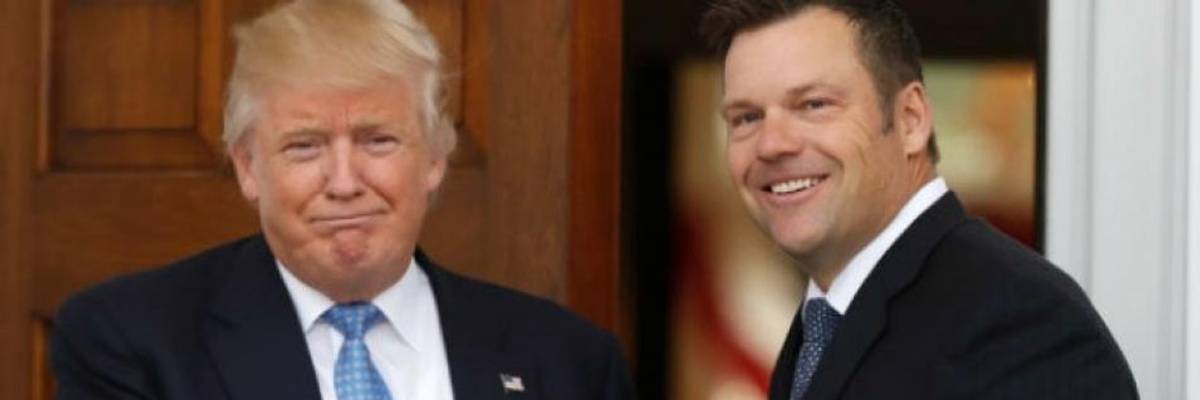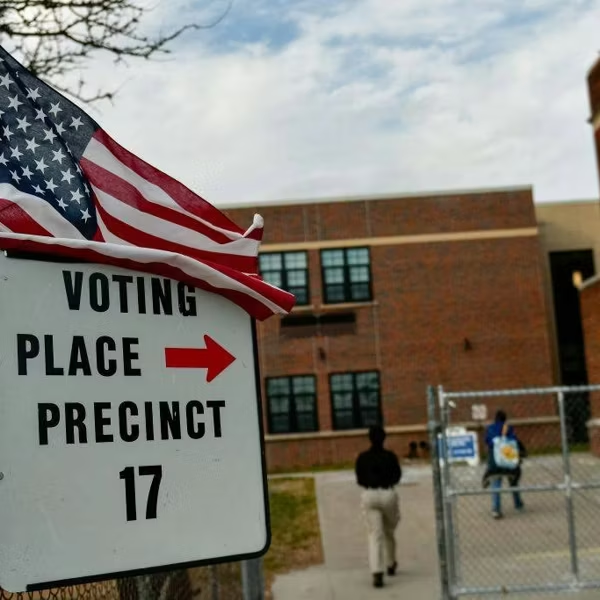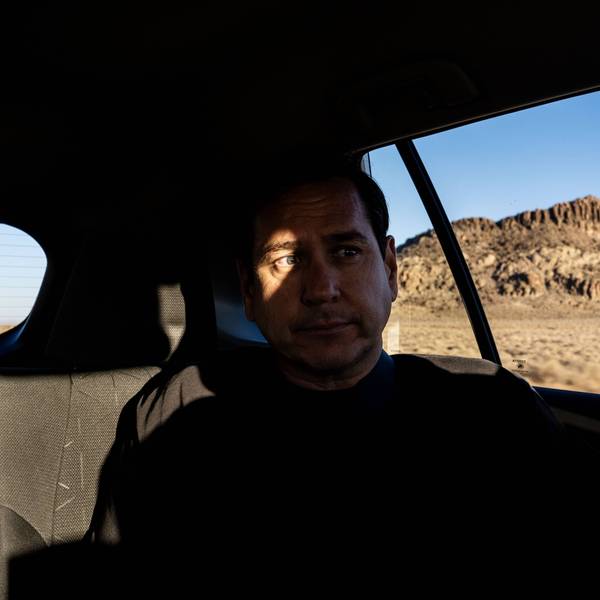
"There's also the matter of the commission's vice chair Kris Kobach. He has a lengthy voter suppression record, which should be enough to cause anxiety for anyone who wants to protect the right to vote." (Photo: Carolyn Kaster/AP)
Kris Kobach, the Man Charged With Enhancing Americans' Confidence in Elections, Says That We May Never Know Who Won The Election
"What are they worried about?" he asked. "There's something. There always is."
But in fact, states have already told the president and commission what they are worried about. Delaware worries that the commission is "a disingenuous and inappropriate campaign against one of the nation's foundational institutions." Kentucky gauges that the commission is "at best a waste of taxpayer money and at worst an attempt to legitimize voter suppression efforts across the country." Pennsylvania has "serious reservations about the true intentions of this effort in light of the false statements this administration has made regarding voting integrity, the historical suppression of voting rights, and the way that such data has been used in the past."
And then there's also the matter of the commission's vice chair Kris Kobach. He has a lengthy voter suppression record, which should be enough to cause anxiety for anyone who wants to protect the right to vote.
As Kansas' secretary of state, Kobach launched an effort in 2011 to enforce one of the strictest registration standards in the country, which had blocked 18,000 eligible Kansans from registering to vote. The ACLU sued -- and won. Kobach was then ordered to process the 18,000 voter applications. In the ruling, U.S. District Judge Julie Robinson found "the sheer magnitude of potentially disenfranchised voters impacted by the Documentary Proof of Citizenship law and enforcement scheme cannot be justified by the scant evidence of noncitizen voter fraud." She pointed out that the state had identified only three illegal voters and a handful of illegal registrants from 2000 to 2013.
Reality hasn't stopped Kobach from peddling the false premise that voter fraud is a serious election menace. In 2015, he successfully lobbied the state legislature for prosecutorial power, allowing him to pursue allegations of voter fraud in court, which made him the only secretary of state in the country with this authority. At the time, Kobach said he had identified more than 100 possible cases of double voting, or voting in two states. Two years later, he has secured nine convictions, most of them involving older registered Republicans.
None of them involved in-person impersonation. Eight of the nine cases involved double voting. August L. Wilson spent 18 months fighting Kobach's charge and paid more than $50,000 in legal fees for what he describes as "an honest mistake." Just one case dealt with a noncitizen voting: He was in the process of naturalization at the time and is now a U.S. citizen.
On his radio show, Kobach admitted that he was only able to find just one or two possible cases of in-person voter fraud, the very type of fraud that politicians like to cite in order to justify voter ID laws, in Kansas over a 13 year period.
Despite failing to find "rampant" voter fraud in his own backyard, Kobach continues to insist it's a nationwide problem. He also continues to sow doubt in the public about the results of the election. Just after the commission's first meeting, he told NBC News' Katy Tur that Americans "may never know" if Hillary Clinton won the 2016 popular vote. When Tur asked whether the votes for Donald Trump were also in question, Kobach answered, "absolutely."
Hillary Clinton won the 2016 popular vote by more than 2 million votes. Donald Trump won the Electoral College by 77 votes. A refusal to accept these facts would be alarming from any elected official, but it is outrageous coming from the person who has been given the mission to "enhance the American people's confidence in the integrity of the voting processes used in Federal elections."
Kris Kobach is not seeking to bolster anyone's confidence in American elections by falsely claiming that we may never know who received more votes. Instead, he is furthering his voter suppression agenda. By falsely claiming that large numbers of noncitizens are voting in elections and that people are double voting en masse, the commission will have a pretext to push for voter purges, restrictive voting laws, and burdensome registration standards.
Make no mistake: Kris Kobach tried to suppress the vote in Kansas with disastrous results. And now he wants to take his campaign nationwide.
An Urgent Message From Our Co-Founder
Dear Common Dreams reader, The U.S. is on a fast track to authoritarianism like nothing I've ever seen. Meanwhile, corporate news outlets are utterly capitulating to Trump, twisting their coverage to avoid drawing his ire while lining up to stuff cash in his pockets. That's why I believe that Common Dreams is doing the best and most consequential reporting that we've ever done. Our small but mighty team is a progressive reporting powerhouse, covering the news every day that the corporate media never will. Our mission has always been simple: To inform. To inspire. And to ignite change for the common good. Now here's the key piece that I want all our readers to understand: None of this would be possible without your financial support. That's not just some fundraising cliche. It's the absolute and literal truth. We don't accept corporate advertising and never will. We don't have a paywall because we don't think people should be blocked from critical news based on their ability to pay. Everything we do is funded by the donations of readers like you. Will you donate now to help power the nonprofit, independent reporting of Common Dreams? Thank you for being a vital member of our community. Together, we can keep independent journalism alive when it’s needed most. - Craig Brown, Co-founder |
"What are they worried about?" he asked. "There's something. There always is."
But in fact, states have already told the president and commission what they are worried about. Delaware worries that the commission is "a disingenuous and inappropriate campaign against one of the nation's foundational institutions." Kentucky gauges that the commission is "at best a waste of taxpayer money and at worst an attempt to legitimize voter suppression efforts across the country." Pennsylvania has "serious reservations about the true intentions of this effort in light of the false statements this administration has made regarding voting integrity, the historical suppression of voting rights, and the way that such data has been used in the past."
And then there's also the matter of the commission's vice chair Kris Kobach. He has a lengthy voter suppression record, which should be enough to cause anxiety for anyone who wants to protect the right to vote.
As Kansas' secretary of state, Kobach launched an effort in 2011 to enforce one of the strictest registration standards in the country, which had blocked 18,000 eligible Kansans from registering to vote. The ACLU sued -- and won. Kobach was then ordered to process the 18,000 voter applications. In the ruling, U.S. District Judge Julie Robinson found "the sheer magnitude of potentially disenfranchised voters impacted by the Documentary Proof of Citizenship law and enforcement scheme cannot be justified by the scant evidence of noncitizen voter fraud." She pointed out that the state had identified only three illegal voters and a handful of illegal registrants from 2000 to 2013.
Reality hasn't stopped Kobach from peddling the false premise that voter fraud is a serious election menace. In 2015, he successfully lobbied the state legislature for prosecutorial power, allowing him to pursue allegations of voter fraud in court, which made him the only secretary of state in the country with this authority. At the time, Kobach said he had identified more than 100 possible cases of double voting, or voting in two states. Two years later, he has secured nine convictions, most of them involving older registered Republicans.
None of them involved in-person impersonation. Eight of the nine cases involved double voting. August L. Wilson spent 18 months fighting Kobach's charge and paid more than $50,000 in legal fees for what he describes as "an honest mistake." Just one case dealt with a noncitizen voting: He was in the process of naturalization at the time and is now a U.S. citizen.
On his radio show, Kobach admitted that he was only able to find just one or two possible cases of in-person voter fraud, the very type of fraud that politicians like to cite in order to justify voter ID laws, in Kansas over a 13 year period.
Despite failing to find "rampant" voter fraud in his own backyard, Kobach continues to insist it's a nationwide problem. He also continues to sow doubt in the public about the results of the election. Just after the commission's first meeting, he told NBC News' Katy Tur that Americans "may never know" if Hillary Clinton won the 2016 popular vote. When Tur asked whether the votes for Donald Trump were also in question, Kobach answered, "absolutely."
Hillary Clinton won the 2016 popular vote by more than 2 million votes. Donald Trump won the Electoral College by 77 votes. A refusal to accept these facts would be alarming from any elected official, but it is outrageous coming from the person who has been given the mission to "enhance the American people's confidence in the integrity of the voting processes used in Federal elections."
Kris Kobach is not seeking to bolster anyone's confidence in American elections by falsely claiming that we may never know who received more votes. Instead, he is furthering his voter suppression agenda. By falsely claiming that large numbers of noncitizens are voting in elections and that people are double voting en masse, the commission will have a pretext to push for voter purges, restrictive voting laws, and burdensome registration standards.
Make no mistake: Kris Kobach tried to suppress the vote in Kansas with disastrous results. And now he wants to take his campaign nationwide.
"What are they worried about?" he asked. "There's something. There always is."
But in fact, states have already told the president and commission what they are worried about. Delaware worries that the commission is "a disingenuous and inappropriate campaign against one of the nation's foundational institutions." Kentucky gauges that the commission is "at best a waste of taxpayer money and at worst an attempt to legitimize voter suppression efforts across the country." Pennsylvania has "serious reservations about the true intentions of this effort in light of the false statements this administration has made regarding voting integrity, the historical suppression of voting rights, and the way that such data has been used in the past."
And then there's also the matter of the commission's vice chair Kris Kobach. He has a lengthy voter suppression record, which should be enough to cause anxiety for anyone who wants to protect the right to vote.
As Kansas' secretary of state, Kobach launched an effort in 2011 to enforce one of the strictest registration standards in the country, which had blocked 18,000 eligible Kansans from registering to vote. The ACLU sued -- and won. Kobach was then ordered to process the 18,000 voter applications. In the ruling, U.S. District Judge Julie Robinson found "the sheer magnitude of potentially disenfranchised voters impacted by the Documentary Proof of Citizenship law and enforcement scheme cannot be justified by the scant evidence of noncitizen voter fraud." She pointed out that the state had identified only three illegal voters and a handful of illegal registrants from 2000 to 2013.
Reality hasn't stopped Kobach from peddling the false premise that voter fraud is a serious election menace. In 2015, he successfully lobbied the state legislature for prosecutorial power, allowing him to pursue allegations of voter fraud in court, which made him the only secretary of state in the country with this authority. At the time, Kobach said he had identified more than 100 possible cases of double voting, or voting in two states. Two years later, he has secured nine convictions, most of them involving older registered Republicans.
None of them involved in-person impersonation. Eight of the nine cases involved double voting. August L. Wilson spent 18 months fighting Kobach's charge and paid more than $50,000 in legal fees for what he describes as "an honest mistake." Just one case dealt with a noncitizen voting: He was in the process of naturalization at the time and is now a U.S. citizen.
On his radio show, Kobach admitted that he was only able to find just one or two possible cases of in-person voter fraud, the very type of fraud that politicians like to cite in order to justify voter ID laws, in Kansas over a 13 year period.
Despite failing to find "rampant" voter fraud in his own backyard, Kobach continues to insist it's a nationwide problem. He also continues to sow doubt in the public about the results of the election. Just after the commission's first meeting, he told NBC News' Katy Tur that Americans "may never know" if Hillary Clinton won the 2016 popular vote. When Tur asked whether the votes for Donald Trump were also in question, Kobach answered, "absolutely."
Hillary Clinton won the 2016 popular vote by more than 2 million votes. Donald Trump won the Electoral College by 77 votes. A refusal to accept these facts would be alarming from any elected official, but it is outrageous coming from the person who has been given the mission to "enhance the American people's confidence in the integrity of the voting processes used in Federal elections."
Kris Kobach is not seeking to bolster anyone's confidence in American elections by falsely claiming that we may never know who received more votes. Instead, he is furthering his voter suppression agenda. By falsely claiming that large numbers of noncitizens are voting in elections and that people are double voting en masse, the commission will have a pretext to push for voter purges, restrictive voting laws, and burdensome registration standards.
Make no mistake: Kris Kobach tried to suppress the vote in Kansas with disastrous results. And now he wants to take his campaign nationwide.

